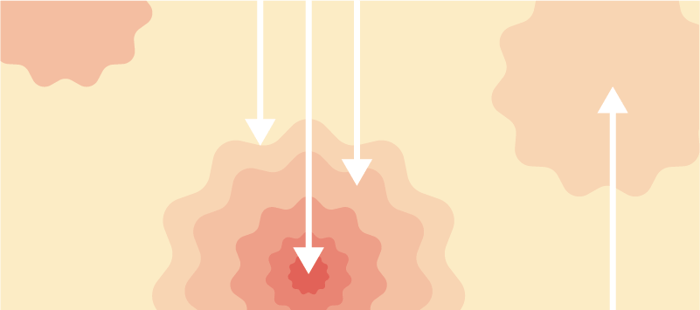Table of Contents
If you had the opportunity to harness a daily product with benefits for your brain, skin, eyes, heart, and immune system, wouldn't you seize it? Well, this type of nutrient exists — and it's omega-3 fatty acids.*
Although omega-3s deliver an array of vital functions, such as assisting in cardiovascular and cognitive functions, many people, regardless of age, fall short in consuming these essential healthy fats. Omega-3s are aptly labeled "essential" because our bodies lack the capacity to produce them internally, highlighting the importance of sourcing them from our diets and, when necessary, supplements.
Recognizing the telltale signs and symptoms of omega-3 deficiency—such as dry eyes and skin, depression, and joint pain—empowers you to pinpoint potential nutritional gaps in your diet, helping you to make informed decisions regarding supplementation to safeguard your health.
In this article, learn about common signs of omega-3 deficiency, the dangers this deficit can cause, and ways to help boost your intake.
Why We Need Omega-3s

Omega-3 fatty acids are essential polyunsaturated fats that play a vital role in brain health, cardiovascular function, joint mobility, and overall well-being. Despite their significance, many people overlook the importance of omega-3s in their diet, leading to potential deficiencies and associated health issues.*
One of the main benefits and roles of omega-3 fatty acids, particularly EPA and DHA, is managing inflammation. On the other hand, omega-3 deficiency can lead to an imbalance in the body's inflammatory response, contributing to chronic inflammation and the development of inflammatory diseases.
While short-term (acute) inflammation is a natural response to sickness, injury, and exposure to harmful chemicals and pathogens, chronic inflammation can lead to conditions like heart disease, rheumatoid arthritis, and even cancer.
Overall, we need omega-3s for benefits including*:
- Brain health and cognitive function
- Heart health, as omega-3 can reduce cardiovascular mortality and improve cardiovascular outcomes such as cholesterol levels
- Healthy skin and hair
- Alleviation of joint pain and stiffness
- Reduced symptoms of depression and anxiety
- Eye health and vision
- Muscle function, energy production, and recovery after exercise.
- Fetal development during pregnancy
- Overall immune system function
Consequences of Omega-3 Deficiency

A "nutritional deficiency" means that you aren’t getting enough of an essential nutrient in your diet that your body needs to function at its best. As you can see, an example of one such nutrient is omega-3s.
Omega-3 deficiency can be a major cause for concern, as it can have far-reaching implications for mental performance, brain health, cardiovascular function, joint integrity, skin and eye health, and more.*
For instance, people who lack omega-3s may be at greater risk for health conditions such as high cholesterol and atherosclerosis (hardening of the arteries), poor cognitive performance and memory loss, depression, and arthritis, underscoring the importance of meeting daily omega-3 requirements.
Recognizing Omega-3 Deficiency: Common Signs and Symptoms
How do you know if you're not meeting your omega-3 needs? Below are the signs and symptoms that may point to omega-3 deficiency:
1. Dry Skin, Hair, and Nails
 Fatty acids like omega-3s play critical roles in both the appearance and the function of your skin. The two layers of your skin, the epidermis, and the dermis, rely on fatty acids to stay hydrated and protect against potential irritants. An omega-3 deficiency could be linked to dry skin and other inflammatory skin issues like acne and dermatitis. *
Fatty acids like omega-3s play critical roles in both the appearance and the function of your skin. The two layers of your skin, the epidermis, and the dermis, rely on fatty acids to stay hydrated and protect against potential irritants. An omega-3 deficiency could be linked to dry skin and other inflammatory skin issues like acne and dermatitis. *
Similarly, your hair and nails also depend on omega-3s for their cell structure and can be affected by an omega-3 deficiency.
2. Dry Eyes
Omega-3s are also crucial for keeping your eyes healthy. They help improve the oil film on your eyes, keeping them hydrated and preventing dry eyes symptoms.
3. Affected Eyesight
 In addition to comfort, omega-3 fatty acids are also important for maintaining vision, especially as you grow older. Research has found that a sufficient omega-3 intake can be protective against macular degeneration, an age-related disease that can lead to severe vision loss. Not surprisingly, an omega-3 deficiency can have the opposite effect since your eyes are less protected from degeneration.*
In addition to comfort, omega-3 fatty acids are also important for maintaining vision, especially as you grow older. Research has found that a sufficient omega-3 intake can be protective against macular degeneration, an age-related disease that can lead to severe vision loss. Not surprisingly, an omega-3 deficiency can have the opposite effect since your eyes are less protected from degeneration.*
4. Joint Pain
 Many people complain of tight, achy joints, especially as they grow older. The pain and stiffness that you feel in your joints could be due to inflammation, especially under conditions like rheumatoid arthritis, where your body attacks its own tissues.
Many people complain of tight, achy joints, especially as they grow older. The pain and stiffness that you feel in your joints could be due to inflammation, especially under conditions like rheumatoid arthritis, where your body attacks its own tissues.
The omega-3s DHA and EPA from your diet can be converted into powerful anti-inflammatory compounds that can put a stop to an out-of-control inflammatory response and bring some pain relief. *
5. Brain Fog and Decreased Cognitive Function
 Your brain is largely made up of fat, including omega-3 fatty acids DHA and EPA. These healthy fats are used as ingredients to build the cells in your brain and can keep your neurons firing on all cylinders.
Your brain is largely made up of fat, including omega-3 fatty acids DHA and EPA. These healthy fats are used as ingredients to build the cells in your brain and can keep your neurons firing on all cylinders.
So an adequate amount of omega-3s can help your brain with focus, memory, and learning ability. On the other hand, brain fog and decreased cognitive function could point to dietary insufficiency.*
6. Depression
 Similarly, a lack of omega-3s can also be detrimental to your mental health. Omega-3 deficiencies have been associated with mental disorders like depression, anxiety, dyslexia, bipolar disorder, and attention-deficit disorder.
Similarly, a lack of omega-3s can also be detrimental to your mental health. Omega-3 deficiencies have been associated with mental disorders like depression, anxiety, dyslexia, bipolar disorder, and attention-deficit disorder.
So the first initial signs of an omega-3 deficiency can be either very obvious or more subtle. However, it’s vital to pay attention if you’re experiencing any of these omega-3 deficiency symptoms because they can go on to have major effects on essential systems like your heart and brain.
Omega-3s Requirements: How Much Do We Need?

While there is no established Recommended Dietary Allowance (RDA) for omega-3 fatty acids, aiming for a daily intake of 1.6 grams for adult men and 1.1 grams for adult women can help support overall health. These amounts are recommended by authorities, including the National Institutes of Health (NIH).
The NIH points out that teenagers and pregnant women typically need even more omega-3s than mostly healthy adults to support fetal development, growth, and brain health. Teens and pregnant women should aim to get at least 1.3 to 1.4 grams of omega-3s per day.
Additionally, children need a steady supply of omega-3s for ongoing neurological development, including supporting memory and learning abilities. Children between birth and nine years of age need between 0.5 grams and 1.2 grams of combined omega-3s.
How Common Are Omega-3 Deficiencies In The United States?
Recent research reveals that many adults in the United States need to consume more omega-3s, often because they don't include sufficient fish in their diets or take supplements.
Deficiency in omega-3s is especially common among specific subsets of people, including vegetarians and vegans, who don't eat fish and seafood, which are the most accessible forms of the omega-3s called DHA and EPA.
Women and younger people have also been found to be particularly prone to shortfalls in EPA and DHA needs.
Omega-3 Deficiency Versus Low Intake
Even if you do eat fish, it can still be challenging to get sufficient omega-3s from your diet alone without the help of supplementation.
It's important to distinguish between deficiency and insufficiency concerning omega-3s. While there isn't a standardized recommendation for omega-3 intake, we can gauge omega-3 insufficiency using the AI (Adequate Intake) guidelines or by undergoing a blood test to assess omega-3 levels.
While true omega-3 deficiencies are rare in the United States, many individuals still fall short of meeting the recommended omega-3 intake on a daily basis.
How to Meet Your Omega-3 Needs

The most effective way to meet your needs is to incorporate omega-3-rich foods into your diet, like fatty fish (also called oily or cold water fish), flaxseeds, chia seeds, and walnuts, while also considering supplementation.
This two-fold approach — a balanced diet that includes healthy fats plus supplementation — ensures you're taking steps to satisfy your daily requirements and prevent an omega-3 deficiency.
Best Omega-3 Foods
Below is a list of foods with omega-3s, starting with the most concentrated sources:
- Fatty fish such as salmon, mackerel, sardines, trout, and herring
- Walnuts
- Flaxseeds and flaxseed oil
- Chia seeds
- Hemp seeds
- Algal oil (derived from algae)
- Soybeans and tofu
- Edamame
- Brussels sprouts
- Spinach
- Kale
- Canola oil
- Eggs (enriched with omega-3)
- Grass-fed beef
- Dairy products (enriched with omega-3)
Given that fatty fish are the most concentrated dietary sources of EPA and DHA, if you want to boost your omega-3 intake, you can start by increasing the amount of cold-water oily fish you eat.
The U.S. Food and Drug Administration (FDA) recommends that adults eat about 8 ounces of fish per week, such as two 4-ounce servings weekly. If you eat less than this amount of fatty fish each week, such as salmon and sardines, chances are you can benefit from adding an omega-3 supplement to your diet.
Other foods with omega-3s are available for plant-based eaters, such as walnuts, chia seeds, hemp seeds, and algal oil.
Types of Omega-3 Supplements
There are several types of omega-3 supplements available, made from sources like fish, krill, and microalgae.
Fish oil, whether in capsule or liquid form, is a good option for those who don't include enough fish in their diets.
However, fish oil doesn’t solve the problem for people who can’t or won’t eat fish. This brings us to our next point….
Solutions to Help Vegans Obtain Enough Omega-3s

As mentioned above, for those who follow a plant-based diet, obtaining adequate omega-3s can be particularly challenging.
While plant-based sources like flaxseeds and walnuts do provide some omega-3s in the form of ALA, which is a precursor to EPA and DHA, conversion of ALA into active forms of omega-3s is limited.
If you're a vegan, unfortunately, getting your omega-3s from ALA alone is not as efficient as getting the EPA and DHA directly. The conversion process is unlikely to yield as much EPA and DHA as you need to meet your intake goals.
You would also need to eat a lot of foods with ALA to get enough omega-3s every day. For example, just one gram of ALA (before conversion into DHA and ALA) would equate to eating 10 cups of leafy greens!
For plant-based eaters, algae oil supplements offer a vegan-friendly alternative to fish oil supplements, providing direct and efficient EPA and DHA sources derived from microalgae.
In other words, it's entirely possible to obtain enough essential omega-3s while avoiding eating fish or taking supplements derived from seafood.
Why Choose Algae Oil?
Unlike fish, which obtain their omega-3s from consuming microalgae, the primary producers of DHA and EPA through photosynthesis, algae oil supplements offer a direct and efficient source of these essential fatty acids.
By bypassing the fish and sourcing omega-3s directly from microalgae, the transfer of nutrients to your body is streamlined and more sustainable.
Additionally, opting for algae oil supplements provides an environmental advantage. They are a more eco-friendly choice compared to traditional fish oil supplements, making them suitable for those conscious of their ecological footprint. Whether you follow a plant-based diet or simply prioritize sustainability, algae oil supplements offer a universally beneficial option.
With reputable products like Calgee’s Vegan Omega-3 supplement available, maintaining your health has never been easier. Ready to bridge your omega-3 gap and support your well-being? Consider trying our Vegan Omega-3.
As with any supplement, it's essential to consult your physician to determine the appropriate dosage for your specific needs and health goals.
Key Takeaways on Signs and Symptoms Of An Omega-3 Deficiency
By understanding and recognizing the signs of omega-3 deficiency, you can take steps to add more of these protective and essential fats to your diet. Consuming more omega-3-rich foods and supplementing as needed, such as with algae oil, ensures that you're on the right track to support brain health, cardiovascular function, joint mobility, and overall vitality for years to come.*


